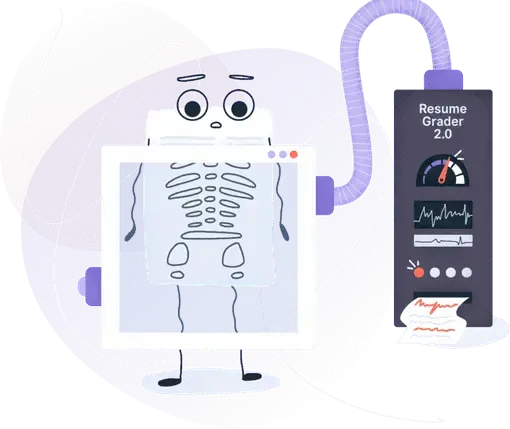Research Skills on a Resume: A Complete Guide for 2026
Position your research skills as the key to your next opportunity.


Is your resume ATS-friendly?
Drop your resume here or upload a file to find out if the skills in your resume are readable by an ATS.
Research skills are crucial in many industries, from business to academia, as they allow professionals to gather, analyze, and apply information to make informed decisions. Including research skills on a resume can set candidates apart, especially for roles that rely on data-driven insights and analytical thinking.
This guide will walk you through why research skills matter, how to underline them on your resume, and tips for making your skills stand out to employers.
Key takeaways
- Highlighting research skills on a resume demonstrates your ability to provide data-driven insights and support informed decision-making.
- Add research skills to resume sections like work experience, education, or a dedicated Skills section to maximize impact.
- Use measurable outcomes to quantify your research achievements, such as percentages, cost savings, or time saved.
- Tailor your research skills to match the job description, ensuring relevancy and alignment with employer expectations.
What research skills to include on a resume?
Research skills are key for anyone focused on gathering, analyzing, and interpreting data to solve complex problems. They open doors to diverse roles in academia, science, corporate, and government sectors, allowing you to make an impact through critical analysis, data interpretation, hypothesis development, and data-driven conclusions.
In short, these skills are essential for exploring topics deeply and achieving success in research-driven careers.
They include hard skills like data analysis and fact-checking, along with soft skills like critical thinking and attention to detail—essential for making informed evidence-based decisions.
Let’s look at other relevant soft research skills to include on a resume for a research-focused position.
Top research-related soft skills for a resume
- Critical thinking
- Attention to detail
- Problem-solving
- Communication
- Flexibility
- Collaboration
- Time management
- Curiosity
- Perseverance
- Creativity
Now, let’s identify the hard skills complementary to research:
Top research-related hard skills for a resume
- Statistical analysis
- Data interpretation
- Data visualization
- Survey methodology
- Database querying (SQL, NoSQL)
- Data collection techniques (Questionnaires, Web scraping, Interviews)
- Scientific experimentation
- SPSS/R programming
- Primary and secondary research
- Advanced Excel
Let’s see when it’s best to showcase your research skills on a resume.
When to put research skills on a resume
Add research skills to your resume if the desired job involves digging into data, solving complex problems, or making informed decisions.
Roles in areas like tech, science, marketing, business analysis, and academia tend to value these abilities. If you’ve gathered insights, planned projects, or analyzed information, outlining your research skills can give your application a real boost.
PRO TIP
Be ready to discuss how your research skills helped you achieve specific results in past roles. Concrete examples strengthen your credibility.
Now, let’s explore the best ways to list your research skills on a resume.
How to list research skills on a resume
Listing research skills on your resume can underscore your analytical abilities and make your profile more appealing to employers. They know that a candidate with strong research abilities can identify opportunities, mitigate risks, and support company goals with reliable data.
- Highlight key research skills in your resume summary. For example: “Analytical researcher with expertise in data visualization and qualitative analysis.”
- In the Work Experience section, emphasize how you applied research skills. Use bullet points to describe specific tasks or accomplishments, like “Conducted data analysis to identify market trends, increasing forecast accuracy by 15%.”
- If you’ve led relevant projects, create a Projects section and describe how you applied research skills in each one. This approach works well for showcasing specific achievements.
- Mention any specialized tools or techniques you’ve mastered (e.g., “SPSS,” “SQL querying,” “Field Research”), as they add credibility to your expertise.
For a clearer picture, take a look at this sample resume.
Resume sample for showing research skills on a resume
Alex Turner’s market research analyst resume is a helpful reference if you need inspiration.
Try our free template as a foundation and let Enhancv’s AI-powered resume builder make customization easy.
Alex Turner
Market Research Analyst
(312) 555-876X | a.turner@enhancv.com | @LinkedIn | Chicago, IL
Summary
Data-driven Market Research Analyst with 7+ years of experience in conducting in-depth market studies, analyzing consumer behavior, and delivering actionable insights for strategic decision-making. Skilled in using research tools like SPSS and Tableau to transform raw data into meaningful findings. Proven ability to handle complex datasets, identify trends, and support business growth through targeted analysis.
Experience
Senior Market Research Analyst
Insight Solutions, Chicago, IL
March 2020 – Present
- Conduct end-to-end research studies, including survey design, data collection, and reporting, supporting strategic marketing initiatives.
- Utilize SPSS and Tableau for data analysis and visualization, increasing insight accessibility and accuracy by 30%.
- Collaborate with cross-functional teams to define project scope, goals, and key performance indicators, ensuring 95% of studies met business objectives.
- Implement a data management system that reduced analysis time by 20% and allowed for efficient tracking of market trends.
Market Research Analyst
DataWave Consulting, Chicago, IL
May 2017 – February 2020
- Managed multiple research projects, from consumer sentiment analysis to competitive landscape studies, ensuring timely and accurate insights.
- Coordinated with product and marketing teams to align findings with business goals, improving campaign effectiveness by 25%.
- Introduced advanced statistical methodologies that enhanced data accuracy and shortened analysis timelines by 15%.
Education
Bachelor of Science in Marketing
University of Illinois, Chicago, IL
May 2017
Certifications
- Market Research Certification (2021)
- Data Science Fundamentals (2020)
Skills
- Market research tools: SPSS, Tableau, Google Analytics
- Data collection and survey design
- Quantitative and qualitative analysis
- Competitive analysis
- Trend identification
- Reporting and data visualization
Languages
- English (Native)
- French (Working proficiency)
Run your document through Enhancv’s free resume checker to make your research skills stand out for ATS.
Is your resume good enough?
Drop your resume here or choose a file. PDF & DOCX only. Max 2MB file size.
Now, let’s look at how to position these skills for top results.
Where to put research skills on a resume
To maximize impact, include your research skills in any of these resume sections:
- Resume Summary: Mention essential research skills in your summary for a strong first impression, e.g., “Skilled in data analysis and qualitative research.” This is especially useful when you want recruiters to spot these skills right away.
- Work Experience: Embed research skills in your Еxperience section, showing real applications, e.g., “Conducted data analysis to increase forecast accuracy by 20%.”
- Education and Certifications: Mention related coursework or certifications to reinforce expertise.
- Projects: If relevant, add a Projects section, highlighting research projects and specific skills used.
Hold this quote in mind as you move forward.
Successful research is about persistence, finding patterns, and making connections others might miss.
Malcolm Gladwell, journalist
Let’s dive in and review some real resume examples.
How to present research skills in the summary
Here’s a quick way to make your research skills shine in your Resume Summary. Start with a brief statement about your background, focus on your top research strengths, and mention any standout achievements that make you a great fit for the role.
This approach will instantly show hiring managers that you’re ready to bring real value with your research skills.
Take a look at this research assistant resume example:
How to present research skills in the experience section
To demonstrate research skills in your Work History section, emphasize your ability to investigate problems, design methodologies, and deliver actionable results. Use action verbs to describe how you conducted research, collaborated with others, or communicated findings that contributed to meaningful outcomes.
See how a research professional structured their resume in this example:
- •Conducted comprehensive literature reviews to identify emerging trends and gaps in urban sustainability research.
- •Designed and implemented qualitative and quantitative research methods, providing actionable recommendations for community planning initiatives.
- •Collaborated with interdisciplinary teams to integrate social and environmental data into strategic frameworks.
- •Authored policy briefs that were adopted by local governments, improving urban sustainability programs in three cities.
- •Presented research findings at regional conferences, fostering partnerships with academic and policy organizations.
How to present research skills in an achievements section
In a resume’s Achievements section, a professional value is best demonstrated through concrete and impactful numbers that go beyond daily responsibilities. Achievements serve as proof of your analytical impact—real results that illustrate how your insights and models made a difference.
Below is an Achievements section taken from a data scientist resume example that draws attention to their strategic influence and distinctive contributions.
How to present research skills in a publications section
In a resume’s Publications section, research skills are best demonstrated by showcasing the depth of your contributions, the significance of the work, and its impact within the field. Publications serve as evidence of your ability to conduct rigorous research, analyze data, and communicate findings effectively.
Below is a Publications section tailored for a Physicist resume, emphasizing research expertise and measurable outcomes.
PRO TIP
To pass ATS filters, integrate relevant keywords throughout your resume and cover letter.
Curious about which jobs value research skills the most? Here’s a closer look.
Which job roles require research skills
Research skills are essential in a variety of professions, enabling individuals to gather, analyze, and interpret information to make informed decisions or provide valuable insights. Here are some roles where research skills are critical:
- Market research analyst
- Data scientist
- Academic researcher
- Business analyst
- Journalist
- Product manager
- Sociologist
- UX researcher
- Investment analyst
- Content strategist
New to the world of research? That’s perfectly fine! Here’s how to make your research skills grab attention, even with little practical experience.
Research skills career progression for students, interns, and juniors
Research skills evolve as you progress from student to professional. Students focus on basics like literature reviews, interns apply skills in real-world tasks, and juniors take on independent, impactful responsibilities.
Here’s a closer look at how research skills evolve along the way.
Student examples:
- Conducted literature reviews and summarized findings for academic assignments, focusing on synthesizing information from diverse sources.
- Assisted in small-scale data collection and analysis using basic statistical tools like Excel and Google Sheets.
- Designed and distributed surveys for class projects, gaining hands-on experience in data-gathering techniques.
Intern examples:
- Supported senior team members by performing in-depth research on industry trends and compiling reports for decision-making processes.
- Used tools like SPSS and Tableau to analyze datasets, identify key patterns, and visualize results for client presentations.
- Collaborated with a cross-functional team to refine research methodologies, improving project efficiency by 15%.
Junior examples:
- Independently managed data collection processes and ensured accuracy by implementing quality control measures.
- Conducted competitive analysis and market research to support product development strategies.
- Presented research findings to stakeholders, highlighting actionable insights and recommending next steps.
How to quantify research skills
Numbers and metrics give context to your skills, turning abstract concepts into concrete evidence.
Here are some ways to quantify your research skills on a resume:
Best practices for measuring research skills
- Use percentages to underline outcomes from your research: “Improved forecast accuracy by 25% through advanced data analysis and trend identification.”
- Show time saved due to streamlined research methods: “Reduced research processing time by 30% by automating data collection workflows.”
- Mention cost savings linked to your research contributions: “Conducted competitive analysis that reduced marketing spend by 15% while boosting ROI.”
- Link your research skills to team or project success: “Collaborated with cross-functional teams on research projects, increasing project efficiency by 20%.”
- Underscore the scale or scope of data handled: “Analyzed a dataset of 500,000 entries to identify customer behavior patterns, informing sales strategies.”
- Connect your research to innovation or process improvements: “Introduced a new data visualization method, improving stakeholder understanding by 35%.”
Six tips on how to improve your research skills
Want to take your research skills to the next level? Whether you’re working on a school project, tackling a big assignment, or just trying to make sense of all the information out there, sharpening your research game can make a huge difference.
Here are six simple, practical tips to help you research smarter, not harder!
- Always start with a specific question or goal. Knowing what you’re looking for will streamline your research and save time.
- Practice analyzing information for credibility, relevance, and bias. This helps you distinguish between reliable sources and questionable ones.
- Stick to reliable sources. Prioritize academic journals, government websites, and reputable publications over unverified sources.
- Use tools like Excel to keep track of collected data. Categorizing information ensures you don’t miss key details.
- Enhance your ability to interpret raw data by learning tools like Excel, Tableau, or Python. Understanding patterns strengthens your conclusions.
- Apply methods like the Cornell Note-Taking System or mind maps to summarize complex information for easy reference later.
Frequently asked questions about research skills on a resume
Can I include unpublished research on my resume?
Yes! If the research is relevant to the role and shows your skills, adding unpublished work can be a great way to highlight your expertise.
What are some common mistakes to avoid when listing research skills?
Avoid vague statements, overloading with technical jargon, and listing skills without providing context or examples of application.
Should I include collaborative research projects on my resume?
Yes, collaborative projects illustrate your ability to work in teams and contribute to collective research efforts, which is valuable to employers.
How can I demonstrate continuous improvement in my research skills?
Mention any additional courses, certifications, or workshops you've completed to enhance your research capabilities.
Make one that's truly you.




